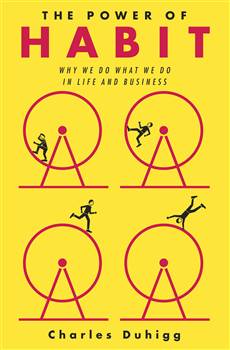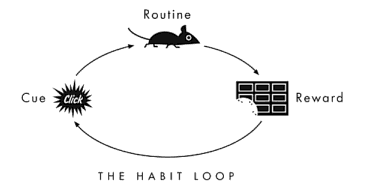The book is quite thick and it is single spaced, with 10' Times New Roman. Not the kind of book I usually read. The book, however, was very interesting! Flipping through its pages felt like an adventure - can be equated to reading The Hunger Games (maybe on a scoreboard Hunger Games will be 9 and the book will be 8 so you know what I mean right? :p)
The writer is an investigative reporter - so i guess all his past investigations gave him extraordinary insight to craft this EXTRAORDINARY book. The content is really interesting, so I am really excited to share what I think about the book! :D I am going to cover it part by part because it is a pretty long book. :)
When I think of habit, I will think about all those small things I do, such as: I button my shirts downwards, I brush my teeth after I wake up and before I sleep, I check my Instagram as soon as I look at my Samsung phone, etc. My small habits, unconsciously, build my daily life. That is why it is so powerful. Small things I start finally become habit without my realization. A concrete example is, I started working out about 1.5 year ago when I did my Master in Sydney. Sydney's environment is really supportive for people who wants to work our outdoors. I just started it due to some health reason and for taking time out from endless study and assignments. Right now, it has become a habit. My brain will keep on questioning me when I skip a workout. It will keep nagging on me until I do it. After I do it, there will be some sense of accomplishment, and good feeling on my mind and body. Being hours in front of computer does not hurt as much as before (when working out was not my habit at all). It just felt really good and I decided to do it over and over again, every certain times.
People never want to be bad. I guess all of us have innate conscience to keep our virtue. No one wants to be alcoholics, gambling-addicts, porn-addicts, and overweight people. It is a small thing that turns big. Overweight people never realize that they are overeating until they see the number on the weight scale. I once saw a TV program where a beautiful woman told a story about how she becomes overweight. It was a really sad story. She said that food has been her source of comfort ever since she was raped when she was 14. Everytime those bad thoughts come, food will be her comforter, the thing that will help her forgetting her bitter past. When she was 15, she has gained a lot of pounds.
What Duhigg found in his research is that habit is a loop, consisting of cue, routine, and reward. Just like in the woman before, her cue is rush of the bitter past memories, her routine is eating, and her reward is feeling of comfort, of being able to brush off those bad thoughts.
This phenomenon also happened to our brain. Why? Because our brain, just like us, always try to make things more and more efficient, so that it can give its energy to more important things, like inventing things, researching, and solving problems. This is why we can automatically do things that we do a lot of times perfectly (such as brushing your teeth, getting out our cars from the parking space, and applying make up before work).
This book really opened my eyes about my own habits. I can understand my cue, my routine, and my reward. I do not just do what I do automatically, but I know why I do it. I know when I do it. I know for what I do it.
The question, however, is can every small thing we start doing become a habit?
I will cover this in the next post. :)


No comments:
Post a Comment